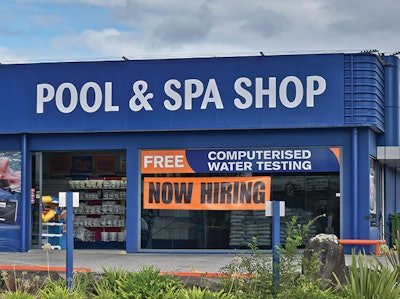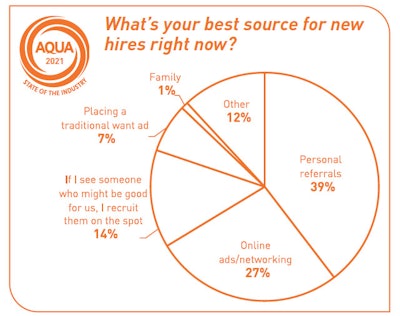
Last year was tough on employee recruitment. While business was booming in the pool and spa retail sector, the pandemic and its repercussions made it difficult for dealers to find workers.
Some feel talent acquisition was hindered by government aid — stimulus checks, though less than what a retail position would pay, influenced some people to stay home — while others simply felt unsafe entering an in-person, workplace environment.
The unusual circumstances around this pool season and last will serve as a change agent for the industry: The dealers that adapted to new recruitment procedures will keep some in place — combining successful new procedures with the old.
AQUA spoke with pool and spa retailers who hired new employees in the last 16 months and picked up some useful "help wanted" procedures and hiring strategies for times of unprecedented demand.
'HELP WANTED' ADS
Stephen Jost, general manager at Dover Pools in Delaware, hires anywhere from 20 to 25 seasonal employees each year across five different retail locations. In an area where job-seekers have many different seasonal work opportunities, Dover Pools has to be competitive in the local hiring market to secure the season's standout applicants.
"Dover Pools is competing against other businesses, rather than interviewees competing against each other," explains Jost. "The top candidates — it's easy to identify each year's standout applicants — put resumes into a number of different places in the area that need seasonal help. Neighboring businesses do a nice job of retaining these reliable workers, much like Dover Pools, so time is of the essence to recruit these candidates quickly and efficiently — to get them to commit.
With that in mind, Dover Pools' help wanted ads are crafted with key takeaways on why the company (and pool and spa industry) is a great place to work. Take a look at its current ad below.

In essence, Dover Pools has successfully taken the strongest arguments for working at its business and wrote an ad that highlights all of those unique qualities — and it works.
RELATED: Hiring for the Sales Floor
"We post this ad to both Indeed and Facebook," says Jost. "We always seem to get good responses from both platforms. Indeed usually has higher-quality candidates, and we certainly value quality over quantity. But Facebook has its advantages, too, like screening social media profiles before inviting applicants to interview."
THE INTERVIEW PROCESS
Mallory Bjekich-Wachowski, retail operations manager at Ill.-based DesRochers Backyard Pools and Spas, writes in her blog "The Millennial Manager" that the two words that make her cringe the most in her career are now hiring.
"It's not my favorite part of the job, but it has gotten easier," says Bjekich-Wachowski. And that's largely due to the fact that she has a specific personality in mind when screening potential candidates. "Now that I have a team of people that exceed my expectations regularly, I know hiring means finding the right person to mesh with the culture we have already built."
The interview process starts with the request of a resume. "I'm initially looking for someone that took the time to brag about themselves a little," she says.
That looks different for each candidate. Some applicants do not have work history — DesRochers is a great place for high schoolers to apply for their first job, for example — and if that is the case, Bjekich-Wachowski looks for other accolades: a high grade point average, after school activities or sports. For management positions, work history is important, but if they don't have traditional experience, Bjekich-Wachowski looks at "what parts of their life would provide experience for a full-time or management job."
The process starts with a general screening by phone. "From that initial phone interview," she says, "I am able to weed people out quickly because if they aren't good on the phone, customer service is not going to work for them."
Applicants also need to check another box: Are they goal-oriented? "If the candidate has clear goals in place — have they picked their college major? Are they saving for a car? — they are usually invited for an in-person interview," says Bjekich-Wachowski.
Once in-house and face-to-face, Bjekich-Wachowski will throw candidates a curveball. "I ask the basics, of course, but I also throw in some interesting questions. After placing a stapler in front of them, one question where I eliminate some people is, 'Can you sell me this stapler?' Some people crumble whereas some think it's funny, loosen up and improvise."
As for managers, Bjekich-Wachowski takes a note from tech-giant Google. "Google will ask random questions and see how somebody will react. For example, 'Why are sewer covers round?' — stuff like that.
"I also ask, 'What was the worst boss you ever had and why?' I really see what the candidate's attitude is like from this question. Did the boss never give them days off and that's why they disagreed? Or was it because the boss didn't coach them?"

LABOR AND THE PANDEMIC
When it was time to hire for the 2020 season, Dover Pools was working with state restrictions and coming up on its busy season. "We were very unsure at how demand would be for pool supplies and services during the pandemic," says Jost. "But what we quickly learned is that demand would be very high."
As the company transitioned from limited hours and curbside pickup to opening its retail stores back up again, there was an immediate need to hire more workers, fast. That's where the company's hiring process evolved. "It evolved from the days of, 'We'll review your application and get back to you,' to a situation where if we felt good about them and they checked some of the boxes, we had to hire them on the spot," says Jost. "Because we knew we might not have a chance to get that candidate back again."
RELATED: 5 Hard Truths of Hiring for Pool & Spa Businesses
And while Jost was used to screening candidates in-person, many decisions were made over the phone. "We did a lot more screening questions over the phone, and some people were hired via that interview," says Jost.
"There were some cases where we did want to meet the candidate in-person, but the majority of questions were still asked over the phone before inviting them into the store."
As for Des-Rochers, Bjekich-Wachowski says hiring during the pandemic was difficult and carried over into the 2021 season, limiting the labor pool of qualified candidates. "I heard a lot of customers saying, 'I told my kids not to work this year. They should enjoy the summer because they couldn't last year.'
"So we really asked the question, 'Well, what are we going to do? We need to hire more workers — especially a manager.'" And that's when the company got lucky. As part of her long-term hiring strategy, Bjekich-Wachowski keeps in touch with past, standout employees that have left for other opportunities and even keeps them on her "Now Hiring" mailing lists.
"That's when a previous manager reached out to me and expressed interest in coming back," she says.
"Staying in touch with past employees really works for us. When things change in life, our good-standing employees are always welcomed back. And in this case, it really helped me out."
LESSONS, NEW AND OLD
As the pandemic ends and the country opens, it's a good time to take stock of procedures and employees added in the last 16 months. For example, amid the hustle of high demand, it's very possible some new hires were just thrown into the mix of things. Which is why Jost suggests dealers should be re-evaluating their job descriptions, and reassess if the right people are working in the right departments.
"Some employees have a knack for water balance and chemistry and should be at the water testing stations. Others are better suited for stocking and assisting customers. And some are really good at the register and greeting customers when they walk in," he says. "Place your employees in a position to succeed.
"One thing I've learned, and especially with the busyness of this past season, is to have an employee learn a lot about just one thing. One person can learn the ins and outs of pool cleaners, another about pumps. I think it makes it more interesting for them — to gain that deep product knowledge and be able to help customers in areas where they would normally have to ask a manager or someone with years of experience for help."
RELATED: Seasonal Employees: Tips for Training, Management and Retention
For Bjekich-Wachowski, the uncertainty around labor has pushed her to focus even more on employee retention. "I am really, really focusing on employee retention this year," she says. "Whether that is through team building, raises or incentives. It's also important to ensure that high-potential employees are on track for future leadership roles."
One big lesson Bjekich-Wachowski will be implementing in the future is to start hiring earlier. "While I normally start looking for new recruitment in February before the season, I'm going to start looking as early as the fall [of the previous year]. Starting in the winterizing season might make the busy time more difficult for new employees, but our orientation process and the support we give them is very hands-on — we want to ensure they feel supported and stick around. Anyone can always come to me with questions."
"And never forget that, in good times and bad, the best resource for employee recruitment is often the customer," says Jost. "You'll hear the managers repeating time and time again, 'Do you know anybody looking for full or part-time work this summer?'
or full or part-time work this summer?' "Because I find that customers, especially our loyal customers, will send back someone dependable — and someone who, most likely, already has a little understanding of the industry."












































